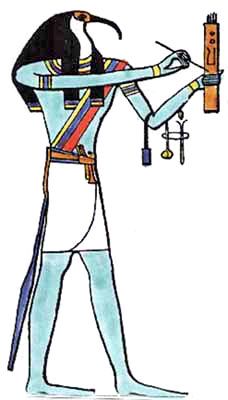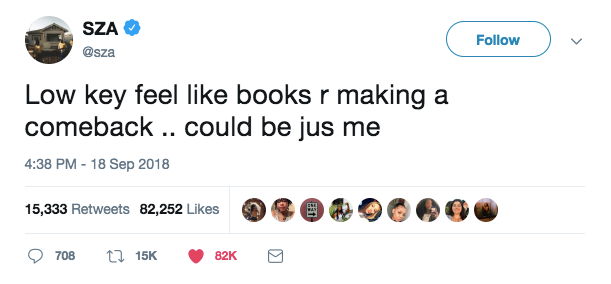A Reader's Manifesto: How We Read in 2019

Ancient Egyptians created the first written language in 3300 BCE. Today we are closer to the year Zero than they were at the time written communication began and humans first started to read.
The Egyptians credited the invention of written language to Thoth, the god of Magic. And indeed it must have seemed like magic. For ideas and stories that could only be communicated from person to person could now be recorded and interpreted by many.

Sparked by such magic, a revolution in human learning, consciousness, and potential began.
5,000 years later, although we no longer spill out drops of ink to honor Thoth, the magic and the power of reading remains.
Reading opens our minds. Shapes our ideas. Fuels our imagination. Demonstrates whats possible and unlocks our potential.
It's magical. It's powerful. And despite the proliferation (or depending on your POV, onslaught...) of communication channels in the last 50 years - it is as relevant as ever.
Books Are Back
Today we might say that books are #trending. But it might be more accurate to say instead of returning, they are the slow and steady turtle about to win the race.

Global book sales are up. The number of independent book stores is growing. In an age of polarization where it seems like Americans can't agree on much, 76% have reading books in common. In 2017 more Americans read more than 12 books than had read none.
It was the selling of books where the largest company in the world (Amazon) began; and books are what our most admired leaders push as tools for success.
The new year is the time when book lists fly around the web and reading goals are made. The latter of which is always focused on numbers. How many and how fast?
It leads to goals of "I'm going to read 100 books this year" or "I'm going to read every book on President Obama's list" and faulty formulations like "If Bill Gates reads 1 book a week, and I read 2, than I'll be just as successful."
But blindly following a prescriptive list or crushing your number goal to publish (brag) on social media is really not the point. It's good. It's fine. It's a heckuva lot more productive than most things you could be doing.
But you can do better. We readers can do better.
Our Readers Manifesto
Our Readers Manifesto is about turning passive reading into active reading. It's about focusing not just on what to read and how many books, but on how you read and what you take away. Your insights, your questions. What you learn about yourself, what you learn about others. Reading counts when this information is retained and put into practice. This is the way reading a book is converted to knowledge.
And knowledge is what we're after. And by the way, all this is not to say reading is not fun, or pleasurable, or entertaining. It is all of those things. But reading is all of those things BECAUSE of what we're able to do with it. Which is learn new things and apply them to our lives (aka the pursuit of knowledge.)
Active Reading
Avid readers know that when they are immersed in a book, they really are in the world of Thoth, a world of magic. Their brain snap, crackles, and pops with new ideas. Train stops are missed and text messages go unanswered because you can't stop turning pages.
It's the thrill of reading a perfectly expressed sentence or learning a new word. The satisfaction of reaching back into some region of your brain to make a connection between something you learned previously and a new piece of related information. It's the crazed feeling of not being able to wait to find out how it ends so you have to look up spoilers (Sorry GRRM, that one's on me).
Avid readers know that when they read a book, they are doing so much more than passively reading black squiggles on a white page. They are actively building new worlds and filing away information in their brains.
Reading counts when its retained and put into practice. And there are a few ways for avid, active readers to get even more value out of what they read.
Reading Journal
Start keeping a notebook to track your notes and observations about the books you read. This is a powerful tool to advance your reading practice. When you write things down you are better able to remember and retain the information. By keeping an active log as you read a particular book, you'll be able to record your insights and thoughts along the way, giving you more more meaningful avenues for introspection and learning.
Most readers I know have had the following happen to them:
Q: Have you read anything good lately?
A: Yeah, I really like "___" because... it was interesting...
Meanwhile their mind is racing to recall even one remotely interesting fact, example, or character trait that you read about.
Keeping a journal of your reading notes will help you process and synthesize information leading to organic evaluation and insight. In other words, the book is the fruit and your goal is the juice. Make sure you get all of the juice!
I was introduced to this concept by a friend and brilliant thinker Alida Miranda-Wolff. Check out her tips on how to start a reading journal here and here. Turns out this is an old practice that Marcus Auerlias and Thomas Jefferson used too. I also learned that from Alida.
And check out an example of one of my own reading journals here. Start easy. Write down quotes you like. New words you learned. Concepts you want to remember.
Book Club
Another way to build on active reading practices to join a book club. Or, like most avid readers, finally go to a meeting why dontcha?
After starting and leading my own book club in Chicago for 4 years, I know that book clubs are proven and powerful; book clubs 1) incentivize reading 2) promote civil discourse 3) allow you to learn something new from someone else with different life experience and 4) spark introspection.
They also usually come with great snacks and wine, so what's not to love?
Epilogue
In this New Year period of reflection and choices, pause to think about yourself as a reader. We all have multiple identities that exist within us all at the same time - and being a Reader is one that millions and millions of us share.
So what do we want as Readers? Do we want to feel bad about how we need to read more, but then never do? Do we want to race to finish as many books as possible? Do we want to immerse in every single "best seller" or "must read" business book because that's what we have to do? Finally, do we want to pay for a service that will summarize books for us so that we don't have to read?
At Italic Type we say NO! We say that readers want to read because we love to read and we love what we get out of reading. We want to get MORE out of it. We're building great technology for readers to do just that.
